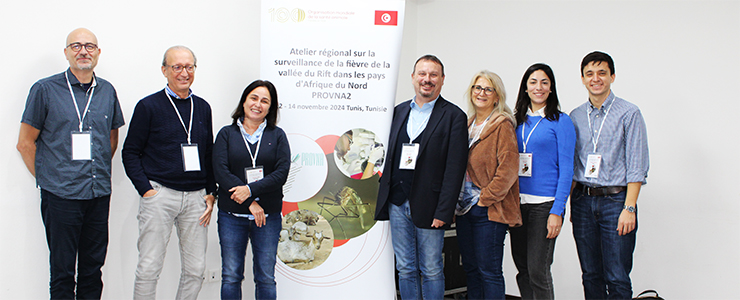The RVF EURL at the inaugural workshop of the Provna 2 project
From November 12 to 14, 2024, the inaugural workshop of the Provna 2 project, titled “Defining Ecoregions and Prototyping an Earth Observation (EO)-based Vector-borne Disease Surveillance System for North Africa,” took place in Tunis. Sponsored by the WOAH, this initiative aims to assist North African countries in enhancing their surveillance efforts for Rift Valley fever (RVF) by harnessing the potential of remote sensing and Earth observation data. The European Union Reference Laboratory (EURL) plays a pivotal role in this undertaking.
The event convened representatives from all participating countries, with the notable absence of Egypt. Over the course of the three-day meeting, delegates from the governments and laboratories of Mauritania, Morocco, Algeria, Tunisia, and Libya collaborated with experts from IZS Te and the RVF EURL to develop a tailored activity program that addresses the specific needs and capacities of each nation. On the first day, IZS Te experts and RVF EURL presented the latest advancements in entomology, virology, epidemiology, and the diagnosis of RVF. Meanwhile, delegates from African countries highlighted their organizational capabilities and resources.
During the remaining days, participants engaged in discussions and reached a consensus on a comprehensive RVF monitoring program for each country. This program incorporates both virological and entomological surveillance activities. The group identified the essential data required to validate and refine the eco-regionalization process and addressed the specific needs of diagnostic laboratories. Moreover, they agreed on capacity-building initiatives to support these surveillance efforts.
PROVNA 2 builds upon the achievements of PROVNA 1, which concluded in August. In PROVNA 1, representatives from all six North African countries participated in identifying the primary ecoregions relevant to the transmission of vector-borne diseases through the analysis of Earth observation data. The findings presented in phase 1 on July 2, 2024, in Lisbon, Portugal, have laid the groundwork for the second phase of project activities, which aim to implement a risk-based surveillance system for RVF across North Africa, utilizing the eco-regionalization methods established in the first phase.


